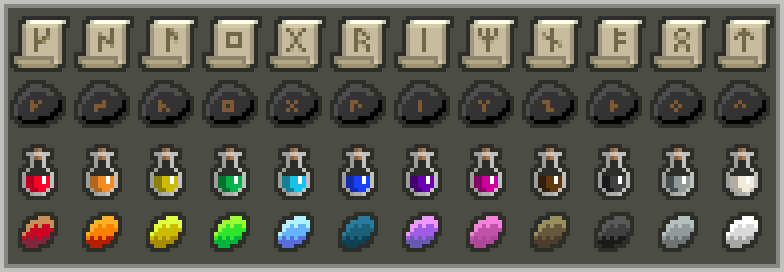Coming Soon to Shattered: Runestones!
Shattered 0.7.0 is currently in development, and it is going to be a very substantial consumable overhaul update! This is a huge milestone, as it marks the last ‘item category overhaul’ update shattered will have. I’ve reworked rings in 0.2.0, wands in 0.3.0, and weapons/armor in 0.4.0 (plus followup updates), and now all that’s left are consumables. Originally 0.1.0 was meant to be the consumable rework update, but my ideas for shattered were much smaller in scope back then.
0.7.0 is focused on two things: giving players way more ability to customize how their consumable items work, and helping players use all of their different consumables effectively. Unlike with equipment, where you generally get a few choices as to what you stick with each game, you are bombarded with consumables and have no control of what their effects are. This often ends up with situations where players will have a pack full of items and no real desire to bother using them. In this blog I’m going to talk about one new source of control over consumable effects, but the full magnitude of 0.7.0 won’t be revealed until later.
Firstly, let’s take a look at scrolls versus potions. The two of them are the primary categories of consumables in the game, but it’s immediately clear that one of them has had more attention. Potions have seeds, which tie into the game’s alchemy system. Scrolls by comparison tend to have more varied and powerful effects, but nothing near the variety potions get with seeds. Seeds also give you control over consumables with alchemy, seeds you don’t like can be mixed together into potions. Seeds also share similar themes to their potion counterparts, which is great for managing complexity.
Wouldn’t it be nice if scrolls had something similar…

Runestones are a companion item to scrolls, just like how seeds are a companion to potions. They have similar effects, and are generally less powerful, but more plentiful. Similarities with seeds begin to end there though, as they are found and used in different ways. It would be a bit boring to have them be exactly like seeds after all. Runestones will be infrequently found through the dungeon, and can be made by alchemizing scrolls. Each scroll will create two or three runestones of a matching type, similarly to how three seeds create a potion. Every scroll has a matching type of runestone.
Here are a few examples:
- Stones of intuition are made from scrolls of identification. Rather than directly telling you what an item is, stones of intuition let you make a guess at what a potion or scroll is. If you’re right, the item is identified. Players who have a good feel for how scrolls and potions are dropped, and have a bit of luck, can make a stone of intuition just as good as a scroll of identify.
- Stones of flock are made from scrolls of mirror image. Somewhat like the old wand of flock, these summon obstructing sheep in an area around where they are thrown. These temporary sheep minions are a great positioning tool, but deal no damage.
- Stones of enchantment are made from scrolls of upgrade. They will grant (or reroll) and enchant/glyph on a weapon/armor, but don’t give any upgrades. This makes it much easier to get a hold of an enchant, but it’s at a pretty big cost.
- Stones of clairvoyance are made from scrolls of magic mapping. They reveal all hidden traps and doors that are visible from where they are thrown. You lose the ability to reveal a whole level, but instead get multiple attempts to make more specific guesses at hidden traps and doors.
Using scrolls as the primary ingredient this time around puts a bigger emphasis on flexibility for them. Alchemy will let you choose whether you want to use the scroll, or the runestones that scroll transforms into! This significantly increases both the variety of effects in the game, and the player’s ability to control how they want to use their scrolls. Even though over 10 items are being added here, they all nicely fit into the same category, which helps mitigate the impact on game complexity.
With runestones being added to the mix, the alchemy system is becoming increasingly complex and varied. Most importantly, runestones show that alchemy doesn’t need to be limited to seeds. This is a great start, but it’s just the beginning of what alchemy is capable of. Look out for part 2 in the coming weeks, where I’ll go more in-depth on the alchemy system itself…
You can discuss this blog post on the Pixel Dungeon Subreddit!



